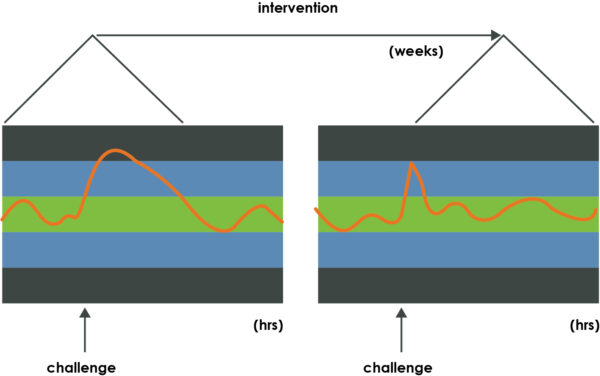Boosting vs. Supporting Your Immune System. What’s the Difference?
Posted by wellmune.com on Mar 11th 2021

When it comes to the immune system, it seems the term ‘boost’ is everywhere. Articles cascade across the internet. Commercials beckon, asking the questions “Can you really ‘boost’ your immune system?” “What foods or beverages can help you ‘boost’ your immune system?” And the list goes on.
But what does ‘boost’ really mean? And is ‘boosting’ really the best thing for immune health? Or might there be another way to support your immune system’s ability to respond to a threat? And, most importantly, what’s the best way to obtain these benefits?
Sonja Nodland, Kerry ProActive Health Principal Scientist, shares insights on the important differences between boosting and supporting immune health, and discusses priming the immune system.
You’re probably already doing more than you think.
Most health-conscious people take steps to protect their immune health as part of their everyday life—likely without realizing it. Diet, exercise and adequate sleep play a well-documented critical role in maintaining overall wellness. In fact, these habits form the foundation of good health. But as the pandemic showed us, many of us are looking for another tool to help support our overall immune health.
So is more better?
While being proactive is well-intentioned, the problem lies in attempting to ‘boost’ the immune system. In its simplest form, the term ‘boost’ means ‘to improve the function of’. As used in the context of improving the immune system, the confusion may be related to semantics. While boosting is sometimes used to mean supporting, the risk may come in when boosting goes beyond supporting. In those cases, the result could be overstimulation. ‘Boosting’ can mean causing the immune system to overcompensate, resulting in a potentially negative reaction.
Our immune system is actually comprised of two parts: the adaptive and innate immune systems. Our innate immune system has the unique ability to become ‘primed’ for performance. This allows our bodies to support our health by helping to maintain the immune system’s natural balance. So perhaps the best course of action is to support the immune system by priming it, rather than ‘boosting’ it.
To understand priming, you need to know that the immune system can be prepped to perform better with substances that function as immunomodulators, substances that can help support immune function by regulating the immune system’s response to a threat. Emerging evidence indicates that yeast beta glucans may ‘train’ or ‘prime’ the body’s immune cells to react more quickly when a pathogen is detected. It’s important to note, however, that although multiple biological activities have been attributed to beta glucans, including immunomodulatory effects, not all beta glucans affect immune activity, with such benefits depending on their chemical structure. A recent study, published in peer-reviewed scientific journal Food Chemistry, helps to illustrate that each source of yeast beta glucan has a unique chemical structure that correlates to its benefits.
Homeostasis is key.
The immune system’s role is intertwined with the functioning of many other body systems, including the nervous system, endocrine system, and digestive system, to name a few. Your body thrives on maintaining homeostasis in all functions, for example, maintaining body temperature and hormonal balance. In the same way, the immune system is also designed to preserve a steady state, performing optimally and responding effectively to illness. A supported immune system is primed for performance.
Why is priming your immune health a good thing?
Immune response is a delicate thing. While it seems like ‘boosting’ it will help it respond more efficiently to an illness, the opposite is often true. A boosted immune system can overstimulate the immune response, throwing it out of balance, and affecting many systems regulated by the body.
‘Boosting’ rather than supporting the immune system by priming it can force the body out of homeostasis (the green zone). Supporting or priming your immune system can help keep you in the green zone, bring you back to homeostasis quicker, or moderate the size or duration of the spike out of the green zone.
Making the case for supporting immune health.
Supporting your immune system by priming it, as opposed to boosting it, means making it as strong as possible. Again, the primary way to do this is to maintain the healthy habits that keep your immune system running smoothly. Providing sufficient nourishment and time to repair itself are the two best gifts you can give your immune system. But experts also agree that sometimes extra nutrients are beneficial to immune health. Providing these nutrients in a manner that helps keep your body well is integral to the concept of supporting, as opposed to boosting.
and time to repair itself are the two best gifts you can give your immune system. But experts also agree that sometimes extra nutrients are beneficial to immune health. Providing these nutrients in a manner that helps keep your body well is integral to the concept of supporting, as opposed to boosting.
Supporting is a holistic concept that takes into account all of the immune system’s components and mechanisms of action. Supporting means compensating for natural, age-related declines in immunity, the effects of stress, and other conditions antithetical to good health. Supporting immunity means providing your body with the tools it needs to function optimally.
How can Wellmune® help support immune health?
Research shows Wellmune®, a yeast beta glucan, works to prime your immune system rather than boost it. When taken daily, as a supplement or formulated into a food or beverage, research shows that Wellmune works to support immune health by binding to neutrophils, the most abundant immune cells in the body. Primed by Wellmune, neutrophils move more quickly to recognize and kill foreign challenges, helping to keep your immune system ready to react to a threat, rather than overstimulating it.
Clinical research has shown that Wellmune can help support the need states that contribute to overall immune health, including:
- Improving general immune health and well-being
- Protecting against the harmful effects of stress
- Promoting healthy energy levels and mental clarity
